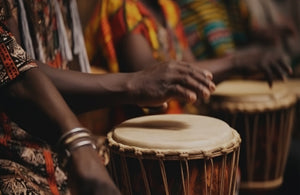The Dark Side of Gold: How Illegal Mining is Devastating Africa
Illegal gold mining is wreaking havoc across Africa, leaving a trail of environmental degradation, economic disparity, and social unrest. In countries like Ghana, this shadow economy—often referred to locally as "galamsey"—has become a critical issue that threatens not only the environment but also the health and livelihoods of millions.
The Unseen Cost of Gold

Gold mining has long been a cornerstone of many African economies. However, the rise of illegal mining operations has introduced a host of problems that far outweigh the economic benefits. Key findings include:
- Environmental Degradation:
- Deforestation and Land Degradation: According to a report by the Ghana Chamber of Mines, illegal mining activities have led to the destruction of over 2.5 million hectares of forest in Ghana alone.
- Water Pollution: A study published in the Journal of Environmental Statistics found that over 60% of water bodies in mining regions are contaminated with heavy metals like mercury and cyanide, posing severe health risks to local communities.
- Economic Disparity:
- Loss of Revenue: The Ghanaian government estimates that it loses about $2.3 billion annually due to illegal mining activities, as reported by the Ghana Revenue Authority.
- Exploitation of Workers: Illegal miners often work in dangerous conditions for minimal pay, lacking any form of legal protection or labor rights.
- Social Unrest:
- Community Displacement: The United Nations Development Programme (UNDP) reports that entire communities have been displaced to make way for illegal mining operations.
- Health Hazards: Respiratory diseases and other health issues have surged in mining areas, with local clinics reporting a 40% increase in related illnesses over the past five years.
Ghana: A Case Study in Crisis
Ghana, one of Africa's largest gold producers, is at the epicenter of this crisis.
- Galamsey Operations:
- Despite government crackdowns, galamsey activities have persisted. A 2019 survey by the Ghana Statistical Service revealed that illegal mining accounts for about 35% of the country's gold output.
- The use of heavy machinery and chemicals without proper regulation exacerbates environmental damage.
- Government Response:
- In 2017, the Ghanaian government launched Operation Vanguard, a military task force aimed at eradicating illegal mining. While initial results were promising, the operation has faced challenges due to corruption and lack of resources, as detailed in a report by the Natural Resource Governance Institute.
- Community Impact:
- Farmers have lost fertile land to mining pits, leading to food insecurity. The Food and Agriculture Organization (FAO) notes a 20% decrease in agricultural output in affected regions.
- Education has been disrupted as schools close due to pollution and unsafe conditions, affecting the future prospects of the youth.

Contributing Factors
Several factors contribute to the persistence of illegal mining:
- Economic Pressures:
- High unemployment rates push locals into illegal mining as a means of survival. The World Bank reports that youth unemployment in Ghana stands at 12%, with underemployment at over 50%.
- Regulatory Gaps:
- Weak enforcement of mining regulations and corruption allow illegal activities to flourish. Transparency International's Corruption Perceptions Index ranks Ghana 75th out of 180 countries, highlighting governance challenges.
- Global Demand for Gold:
- The soaring price of gold on the international market incentivizes illegal mining. As of 2023, gold prices have reached over $1,800 per ounce, according to Gold.org.
The Human Toll

Personal stories bring to light the dire consequences of illegal mining:
- Ama Mensah, a farmer from the Western Region of Ghana, recounts how her farmland was overtaken by illegal miners overnight. "I woke up to find machines tearing up my cocoa farm. There was nothing I could do," she told Al Jazeera.
- Kwame Asante, a former galamsey worker, describes the perilous conditions in the mines. "We used makeshift tools and had no safety equipment. I saw friends die when pits collapsed," he shared with the BBC.
A Call to Action

Addressing the scourge of illegal mining requires a multifaceted approach:
- Strengthening Regulations:
- Governments must enforce mining laws and hold offenders accountable. Collaboration with international bodies can provide the necessary support and oversight.
- Economic Diversification:
- Creating alternative employment opportunities can reduce the reliance on illegal mining. Investment in sectors like agriculture, education, and technology is crucial.
- Community Engagement:
- Empowering local communities through education and resources can enable them to resist illegal mining activities. NGOs and civil society organizations play a vital role here.
- International Cooperation:
- As global demand fuels illegal mining, international stakeholders must ensure their supply chains are free from illicit gold. Initiatives like the OECD Due Diligence Guidance provide frameworks for responsible sourcing.
Conclusion
The dark side of gold casts a long shadow over Africa, particularly in countries like Ghana where illegal mining devastates communities and the environment. By blending hard data with personal narratives, the gravity of the situation becomes undeniable. It's imperative for governments, international organizations, and communities to collaborate in eradicating illegal mining. Only then can we hope to preserve Africa's rich resources for future generations and ensure the well-being of its people.


